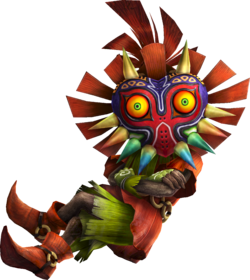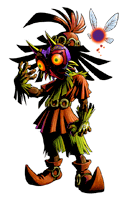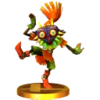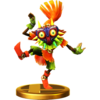Skull Kid
| Skull Kid | |
|---|---|
 
Official artwork of Skull Kid from Hyrule Warriors: Legends. | |
| Universe | The Legend of Zelda |
| Debut | The Legend of Zelda: Ocarina of Time (1998) |
| Smash Bros. appearances | Brawl SSB4 |
| Most recent non-Smash appearance | Hyrule Warriors Legends (2016) |
| Console/platform of origin | Nintendo 64 |
| Species | Skull Kid |
| Gender | Male |
| Voice actor | Sachi Matsumoto |
| Article on Zelda Wiki | Skull Kid |
Skull Kids (スタルキッド, Stal Kid) are recurring characters in The Legend of Zelda series. They appear in Super Smash Bros. Brawl as stickers. The one from The Legend of Zelda: Majora's Mask appears in Super Smash Bros. 4, wearing the titular mask, as an Assist Trophy.
In Super Smash Bros. Melee
Skull Kid himself did not appear, but he was mentioned in the description of the Four Giants trophy and the Majora's Mask trophy.
In Super Smash Bros. Brawl
Skull Kids appear on two stickers in Brawl.
| Name | Game | Effect | Characters |
|---|---|---|---|
| Skull Kid | The Legend of Zelda: Majora's Mask | ||
| Skull Kid | The Legend of Zelda: Ocarina of Time |
 Skull Kid (Zelda Majora's Mask) |
 Skull Kid (Zelda Ocarina of Time) |
In Super Smash Bros. 4
The Skull Kid from The Legend of Zelda: Majora's Mask appears in Super Smash Bros. 4 as an Assist Trophy. As one of the Tips mentions, Skull Kid is one of the only Assist Trophies to have potentially detrimental effects to both enemies and the user. When he appears, he can do one of three things, chosen at random:
- Flips the camera upside-down, similar to Palkia's effect in Spear Pillar.
- Reverses all directional inputs for all players, so left is right and up is down. This does not apply to taunts.
- Turns all fighters invisible.
Trophy Information
It's said that children who get lost in the forest are turned into these music-loving little monsters. In Smash Bros., you can summon one who's sporting Majora's Mask. It'll move into the background and bring down a world of chaos on the whole stage. Even the fighter who summoned him will be affected, so try to keep a level head!
It's said that children who get lost in the forest are turned into these music-loving little monsters. You can summon one in Super Smash Bros. Wearing Majora's Mask, it'll move into the background and bring down a world of chaos on the whole stage. Even the fighter who summoned him will be affected, so try to keep a level head!
Origin
Skull Kids first appeared in The Legend of Zelda: Ocarina of Time as minor characters, but one returns (specifically, the one who befriends Link once he plays Saria's Song to him) in Majora's Mask as the main antagonist in the game under the control of Majora's Mask. This Skull Kid is the basis for Super Smash Bros. 4's Assist Trophy. A Skull Kid (thought to be the same one as he knows Saria's Song) also appears as a minor character in The Legend of Zelda: Twilight Princess as a miniboss.
The Skull Kid's attack as an Assist Trophy is not based on any known ability of Majora's Mask itself, although Skull Kid has been seen using the power of the mask to curse people for his own amusement. Two of his attacks, however, have a mechanic that makes reference to the Stone Tower and its respective temple, which must be inverted for Link to progress.
Gallery
Trivia
- Usually, when Skull Kid makes the fighters invisible, they stay invisible upon losing a life. However, if this happens in Smash Tour, the newly-respawned character will become visible.
- If Skull Kid flips the screen in Training Mode, the training menu and info will also be flipped.
- Conversely, if a character is out of the camera's view and taking hoop damage during a standard match, the hoop will point at the character's actual location, instead of following the flipped camera view.





